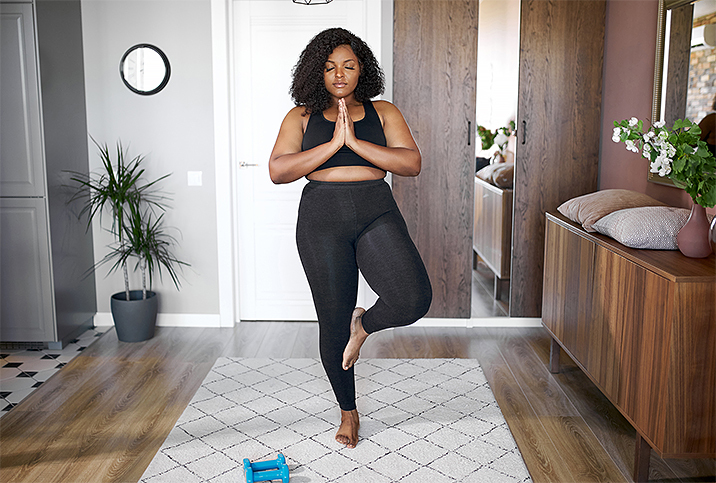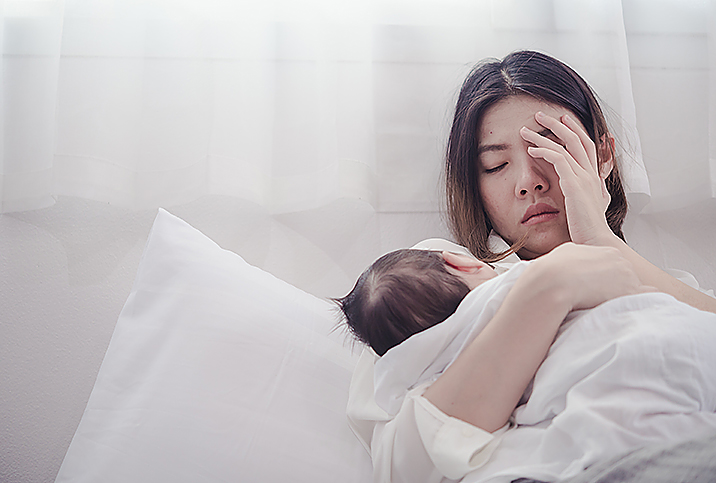Natural Treatments May Help Postpartum Anxiety and Depression

As if having a child isn't stressful enough, parents have to hear all of the unsolicited advice about raising a child. Unfortunately, the stigmas of mental health are such that for all the free parenting tips available, it's much less common to get support for postpartum depression and anxiety. The taboo surrounding this condition just won't go away, leading many women to avoid seeking treatment and instead opting to self-medicate with alcohol or prescription drugs, which can lead to life-altering implications.
The website for Substance Abuse and Mental Health Services Administration (SAMHSA) states, "Indeed, for some conditions, such as chronic pain, prescribed medications may be insufficient or problematic. As a result, people might use other substances, such as marijuana, to self-medicate and to alleviate these stressors."
The dynamic dual diagnosis
The National Alliance on Mental Illness estimates that around 60 percent of anxiety patients also experience chronic depression. As moms manage feeding schedules, unexpected family visits (because everyone wants to meet the baby) and everything else a newborn demands, it can be too easy for us to forget about self-care and setting boundaries. Struggling to set a routine can create added anxiety that makes us feel unable to cope, further impacting our depression and waning sense of self-worth.
Sometimes, our friends and family misunderstand our illness and think we are weak or damaged because we cannot control our symptoms and need medication.
Furthermore, when we have a chronic mental health condition, the stigma associated with mental health can make reaching out for support difficult. Sometimes, our friends and family misunderstand our illness and think we are weak or damaged because we cannot control our symptoms and need medication, while others seem to be able to cope without it.
According to the U.S. Department of Health and Human Services Office on Women's Health, it's estimated that 1 in 9 women will experience postpartum depression. Because each pregnancy is different, you may experience depression with your first child and not with subsequent pregnancies, or vice versa.
Treating the cycle
Your mental health should be a priority because the cycle of anxiety and depression can take all the joy out of parenting. If you are uncomfortable taking medication or want to try natural treatments first, there are options. Of course, be sure to communicate with your doctor about your symptoms and any changes you experience.
For many patients, breathing techniques, journaling or emotional freedom techniques (EFT) can change negative thought spirals and help them cope with panic attacks and depressive thoughts without the use of medication.
According to Kimberly Pisarcik, LCSW, in addition to practicing coping and relaxation strategies, you should also "practice self-nurturing and self-soothing activities, limit commitments, practice body scans and listen to the needs of the body, practice assertive communication skills to meet needs and request help/assistance when necessary."
This last tip is one that many moms, including myself, struggle to practice. Asking for help at any stage of life can be a valuable coping strategy, and whether it's the next diaper change or an afternoon so you can shower and feel like a human again, asking for help can make a noticeable difference in managing depression.
With the help of a licensed counselor and cognitive behavioral therapy, you can use these natural strategies to identify your triggers and negative thought patterns that lead to your anxious and depressive events. This will help you to better manage your symptoms and take control of your life, so you can be emotionally available for your growing family and for yourself.
Entrepreneur and McCord List founder Rachel McCord speaks with Marisa Sullivan about how she coped with postpartum anxiety. Watch the full interview here.
Making lifestyle changes
Making lasting lifestyle changes can help to channel your anxiety into something productive that can improve your mental health while helping you to feel more in control. While getting active and going outside can improve your overall mood, joining an exercise program can provide you with the added mental support of a personal trainer and peers in the class. Many gyms offer classes for moms that can help you find other women navigating similar challenges.
In addition to exercise, changing your diet can also improve your mental health. While research is progressing on the mind-gut connection, it's clear that your intestinal health is intimately tied to your mental health, with about 95 percent of your serotonin receptors coming from your gut. While it's unclear if gut health can lead to mental health disorders, a healthy gut may be the key to easing anxiety and depression.
Replacing processed foods and saturated fats with whole foods, such as fruits and dark leafy greens, can provide necessary nutrients that promote brain function and a healthy immune system and digestive health. Many doctors recommend women continue to take a daily prenatal vitamin while nursing to replenish missing nutrients. If your current diet is less than optimal, it can be overwhelming to suddenly eat healthily, so during the transition, remember that making sustainable lifestyle changes takes time. Rather than judging yourself, remember that some days you will slip up or overindulge, and beating yourself up over it can cause a flare-up in your symptoms.
As Pisarcik said, "Often, during flare-ups, patients experience an increase in symptoms." These symptoms can include "insomnia, racing thoughts/anxious ruminations, increased restlessness, difficulty concentrating, excessive worry, isolation, avoidance and gastrointestinal problems."
Finding a healthy balance
These flare-ups of symptoms can compound one another, making you feel out of control and delaying your recovery. Making lasting changes to your lifestyle and diet can help you find relief, but everybody is different, so talk to your doctor about solutions tailored to you. Some medications can interfere with breastfeeding, but there are antidepressants compatible with nursing, so talk to your doctor if natural methods are not working to alleviate your symptoms. The most important part of your treatment is finding the right balance, so you can feel like yourself and enjoy this time with your new baby.


















